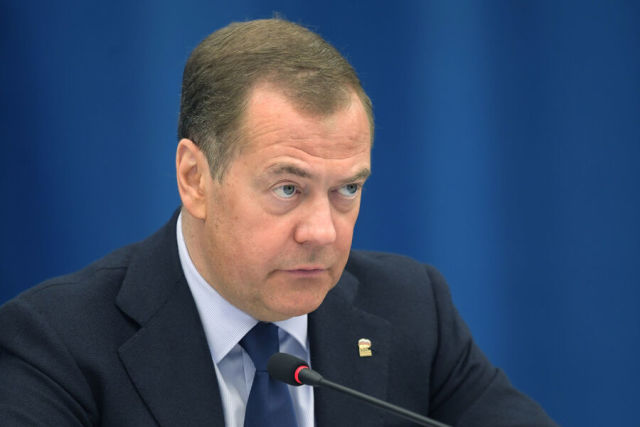Seoul allowed the supply of weapons to Kiev in case of a serious threat to the civilian population Deputy Head of the Russian Security Council Dmitry Medvedev allowed the transfer of Russian weapons to the DPRK in response to the supply of South Korean weapons to Ukraine.
This is how he commented on the words of South Korean President Yun Seok-yong that his country could start supplying weapons to Kiev in the event of a serious threat to the civilian population. The Kremlin believes that sending weapons by Seoul "will indirectly mean a certain stage of involvement in the conflict."
Deputy Chairman of the Security Council of the Russian Federation Dmitry Medvedev said that Russia can supply the DPRK with the latest weapons if South Korea sends weapons to Ukraine.
"Until recently, the South Koreans fervently assured that the possibility of supplying lethal weapons to Kiev was completely excluded. I wonder what the residents of this country will say when they see the latest samples of Russian weapons from their closest neighbors - our partners from the DPRK?" Medvedev wrote in Telegram.
On April 19, the President of the Republic of Korea, Yun Seok-yel, for the first time allowed the possibility of arms supplies to Ukraine. The head of state said this on the eve of his visit to the United States.
As an example of such a situation, Yun Seok-el called "a large-scale attack on civilians, mass killings or a serious violation of the laws of war."
The Head of State added that South Korea will make a decision on assistance to Ukraine taking into account the situation in the war zone and Kiev's relations with the parties involved in the conflict.
According to Yoon Seok-yeon, the South Korean government is studying ways to protect and restore Ukraine, just as Seoul received foreign aid during the Korean War of 1950-1953.
South Korea, a major manufacturer of artillery ammunition and armored vehicles, has so far refused to supply weapons to Kiev, fearing the possible consequences of such a decision for its companies operating in the Russian Federation, Reuters points out.
"There is nothing new in this"
Commenting on the position of the South Korean president, Kremlin spokesman Dmitry Peskov said that such a decision would mean "a certain stage of involvement" of Seoul in the conflict in Ukraine.
In turn, the chairman of the Federation Council Committee on International Affairs Grigory Karasin believes that the statement about possible arms supplies to Ukraine was made under pressure.
"I have the impression that South Korea is under strong pressure, primarily from the United States," Karasin said in a conversation with Lenta.ru .
The senator also expressed the opinion that the decision to send military assistance to the Armed Forces of Ukraine would be hasty. "At a minimum, this is a rash decision, I can say right away, for South Korea and for everything that is happening around Ukraine," he said.
How South Korea helps Ukraine
Seoul began to provide support to Kiev immediately after the start of the Russian military operation. At the same time, the supplies included only humanitarian and non-lethal aid: medicines, bulletproof helmets, bulletproof vests, tents and blankets, chemical and radiological protection equipment.
At the beginning of March 2023, South Korean Prime Minister Han Dok-soo again assured that Seoul was not going to supply weapons to Kiev yet.
In April, Reuters, citing leaked Pentagon documents, reported that South Korea had agreed to sell artillery shells to the United States to help Washington replenish its stocks. Seoul insisted that the "final consumer" of the shells should be the US military, and expressed fears that the ammunition could end up in Ukraine.Polish Prime Minister Mateusz Morawiecki earlier expressed the opinion that South Korea is "afraid of the reaction of Russia and China," therefore refuses to supply Kiev with weapons.
Former South Korean ambassador to Ukraine Kwon Ki Chang told The Washington Post in early April that Seoul could face "economic and diplomatic revenge" from Moscow. He believes that the transfer of weapons to Ukraine will help its army, but then Seoul "will face a real threat of retaliation."
Alice Andreeva

